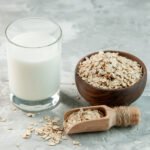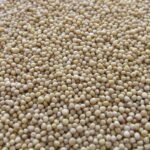Hey there, health enthusiasts! Ever been puzzled over the hype around almond milk? Well, buckle up as we’re about to demystify this popular plant-based beverage.
From its origins to its various uses and remarkable nutritional benefits, we’ll dip into everything you need to know about almond milk. So, let’s pour into it!
The Milky Way: Origins of Almond Milk
While it may seem like a new-age fad, almond milk has a history that runs deep. Originating in the Middle East, this nut-based milk substitute was savored by the medieval nobility in both the Islamic world and Christian Europe.
Fast-forward to today, and almond milk has made a massive splash in the health food scene. Its mild taste and creamy texture, coupled with its low calorie and dairy-free nature, make it a star in various diets, from vegan to keto.
The Many Masks of Almond Milk
One of almond milk’s superpowers is its incredible versatility. Whether you’re looking to jazz up your morning cereal, whip up a dairy-free smoothie, or find the perfect companion for your coffee, almond milk has got your back.

Besides drinking it straight up, you can also use almond milk in baking, cooking, or even to make dairy-free ice cream. And the best part? It’s available in different flavors like vanilla and chocolate, offering a fun twist for your taste buds!
Nutritional Nuts and Bolts of Almond Milk
Almond milk isn’t just about versatility and taste—it’s brimming with health benefits too. Even though it’s lighter in calories, it packs a punch when it comes to essential vitamins and minerals.
But let’s not just talk about it, let’s chalk it out! Here’s the nutritional breakdown for one cup (240 grams) of unsweetened almond milk:
| Components | Amount |
|---|---|
| Calories | 30-50 kcal |
| Fat | 2.5 grams |
| Protein | 1 gram |
| Fiber | 0.5 gram |
| Carbohydrates | 1-2 grams |
Almond Milk FAQ: Your Queries Clarified
It’s natural to have some curiosities brewing about almond milk. So, let’s tackle a few common questions.
Is almond milk good for weight loss?
It sure is! Almond milk is low in calories and sugar, making it a great substitute for regular milk if you’re watching your waistline.
Is almond milk suitable for those with nut allergies?
While it’s a fantastic dairy alternative, those with nut allergies should steer clear of almond milk. When in doubt, always consult a healthcare professional.
How is almond milk made?
At its simplest, almond milk is made by blending almonds with water and then straining the mixture to remove the solids. The result is a creamy, nutty-flavored liquid that’s ready to enjoy!
Final Sip: Wrapping Up the Almond Milk Journey
From its rich history to its diverse uses and impressive health benefits, almond milk is more than just a trendy plant-based milk. It’s a testament to how delicious and diverse healthy eating can be.
So, whether you’re lactose intolerant, vegan, or simply looking to shake up your diet, consider giving almond milk a try. You might just find it’s your cup of tea—or should we say, milk?
Fun Almond Milk Facts:
- Despite its creamy texture, almond milk is naturally lactose-free, making it a popular choice for those with lactose intolerance.
- The process of making almond milk has been around since the Middle Ages!
- Almond milk can be made at home with just almonds, water, and a blender.
Source: Healthline.com




